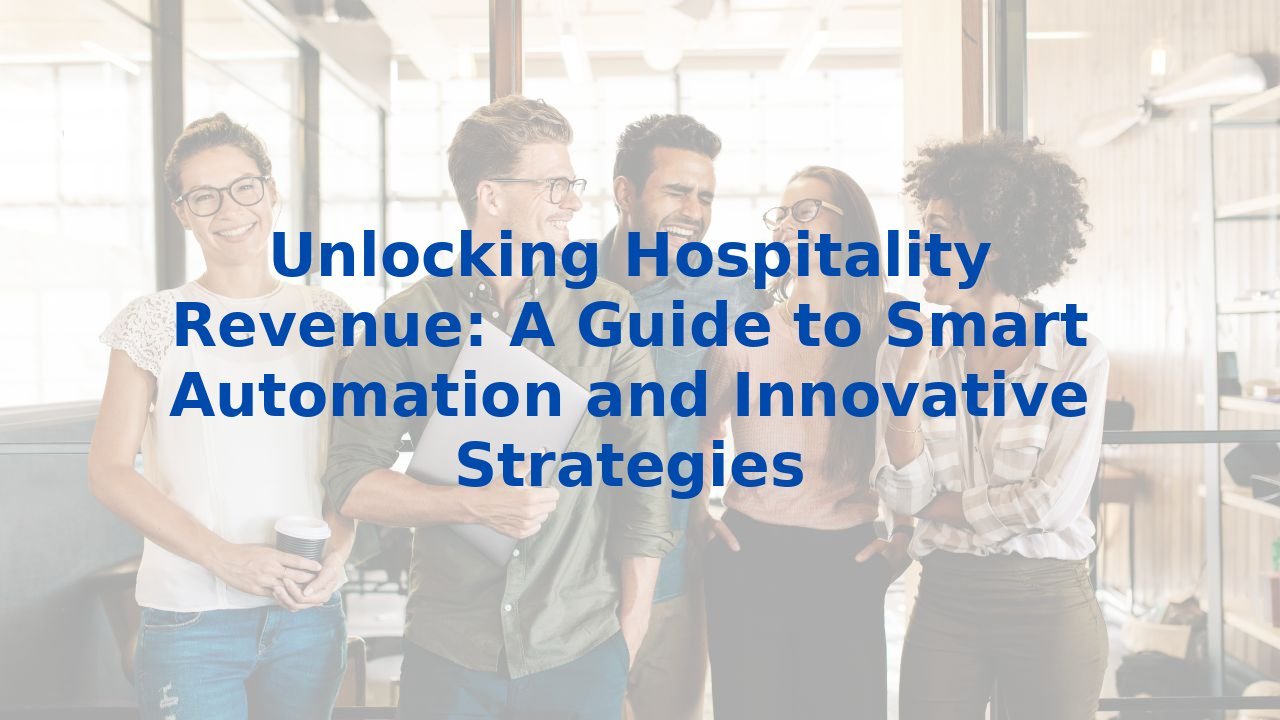Unlocking Hospitality Revenue: A Guide to Smart Automation and Innovative Strategies
Unlocking Hospitality Revenue: A Guide to Smart Automation and Innovative Strategies
In an era where hospitality businesses face unprecedented challenges and competition, the need for innovative strategies becomes essential. With the rapid advancement of technology, particularly in the realm of Artificial Intelligence (AI), hotels, restaurants, and other establishments can revolutionize their operations. Embracing smart automation not only enhances efficiency but also drives revenue growth effectively. In this blog post, we explore how AI transforms hospitality business processes, revealing the myriad benefits that come along with it.
AI-Driven Process Discovery: Finding Hidden Opportunities
To improve efficiency, it’s crucial to first understand the current state of your processes. AI-driven process discovery leverages data analysis across various systems to identify inefficiencies and hidden opportunities within the organization. This technique, known as process mining, reveals where bottlenecks occur and helps create a comprehensive overview of operations.
By closely examining the flow of data, businesses can pinpoint areas needing enhancement and minimize redundancies. In the hospitality sector, this could mean reevaluating everything from booking processes to staffing allocations, ensuring peak performance at every step.
AI Process Mapping: A Blueprint for Operational Success
Once organizations identify their inefficiencies, the next step is to create actionable insights to guide improvements. AI process mapping utilizes machine learning to visualize workflows, ensuring that an organization’s processes remain dynamic and adaptable. For hospitality venues, this translates to clearer operational workflows that ensure staff can deliver exceptional guest experiences seamlessly.
By continuously updating these process maps, businesses can swiftly respond to changing demands, whether refining guest check-in procedures or optimizing kitchen operations during peak hours.
AI Process Automation: Efficiency Redefined
The hallmark of AI in hospitality comes to life through process automation. Robotic Process Automation (RPA) takes over repetitive, rule-based tasks—everything from managing reservations and processing payments to handling customer inquiries. By employing these AI-driven automation tools, hospitality businesses can operate around the clock while increasing accuracy in service delivery.
This not only boosts operational efficiency but frees your team to focus on more strategic tasks such as guest relations and service innovation. Imagine your staff harnessing their creativity to craft personalized experiences rather than getting bogged down with routine inquiries.
AI for Continuous Process Improvement
The journey doesn’t end with automation. AI fosters a culture of continuous improvement by providing real-time feedback and data-driven insights. As hospitality businesses implement AI tools, they gain a deeper understanding of performance metrics—empowering them to adjust their strategies on the fly. This adaptability is crucial in an industry where consumer preferences can change overnight.
AI Process Optimization: Maximizing Performance
AI process optimization enhances decision-making by analyzing vast amounts of data, identifying patterns, and predicting outcomes. For hospitality organizations, this could mean optimizing staff scheduling based on predicted occupancy or adjusting menu offerings according to seasonal preferences. The refinement of these processes leads to improved guest experiences and, ultimately, higher revenues.
The Multifaceted Benefits of AI in Hospitality
Integrating AI into hospitality processes yields an array of benefits, such as:
- Enhanced Decision-Making: AI presents predictive insights that empower managers to make informed strategic choices.
- Increased Productivity: Automation relieves teams from tedious tasks, elevating their focus on guest engagement and service quality.
- Fewer Errors: AI tools minimize human errors by executing repetitive tasks with precision and consistency, elevating service standards.
- Real-Time Process Monitoring: Ongoing data collection enables prompt identification and resolution of potential issues, ensuring smooth operations.
The Importance of AI Training for Employees
While the transformative power of AI is undeniable, its true potential can only be unlocked when employees are equipped to collaborate with these technologies effectively. Employee training in AI is essential for several reasons:
- Knowledge of AI Tools: Staff must understand how to utilize AI technologies within existing workflows to enhance efficiency.
- Adaptation to Change: Training programs facilitate a smoother transition into AI-powered operations and encourage acceptance of new processes.
- Maximizing the Benefits: Well-informed employees are capable of identifying opportunities for leveraging AI in novel ways to boost service and revenue.
Conclusion: The Future of Hospitality Awaits
The hospitality industry stands at a crossroads, and embracing AI-driven solutions presents a unique opportunity to redefine revenue potential. By enhancing processes through discovery, mapping, automation, and continuous improvement, organizations can unlock new levels of efficiency and accuracy. Coupled with robust employee training, these innovations ensure that staff are prepared to wield AI's transformative power, leading to enhanced guest experiences and lasting business success in an ever-evolving market.
Invest in smart automation today, and witness how it transforms the way your hospitality business operates.



